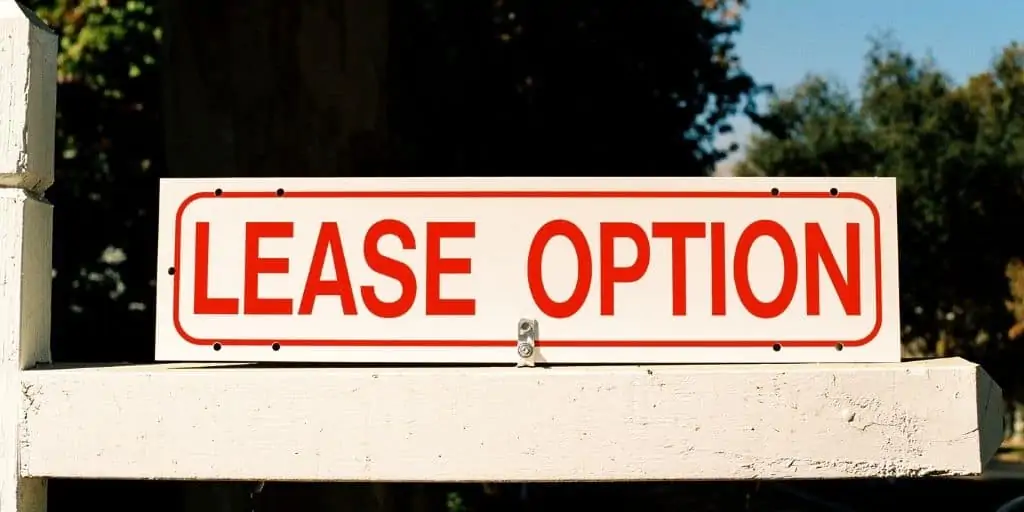
REtipster does not provide legal advice. The information in this article can be impacted by many unique variables. Always consult with a qualified legal professional before taking action.
A few months ago, I had the good fortune of meeting Chris Michaud.
Chris has extensive expertise in many areas of real estate, including (but not limited to) coaching investors, brokerage, marketing, residential rehab, land development, multi-family, private lending, options, leasebacks, and more.
When I first met Chris, he told me about a fascinating strategy he has used to close deals with a creative financing instrument called the Lease-Option Purchase Agreement. I've known about Lease Options for a while, but he helped me to see some of its new applications, and why this strategy deserves some air time here on the REtipster Blog – because it can be an extremely beneficial tool for both parties in many real estate transactions.
Many people fail to recognize the incredible benefits of this type of agreement at first glance, but this type of creative financing arrangement can be a game-changer for many real estate transactions.
Chris was kind enough to put together a guest post explaining the basics of how they work, so I wanted to share it with you today. Take it away Chris!
The Lease-Option Purchase Agreement is a creative and innovative way to open the doors of opportunity for both the sale and acquisition of real estate.
RELATED: How a Lease Option Works
In many instances, it is seen as more of a “last resort” instead of the preferred solution for property ownership. While many prospective property owners would prefer to “own outright” by utilizing cash, or cash along with a conventional mortgage arrangement – most of these people don't realize that these methods often require a much larger financial investment than a Lease-Option, with substantially more qualification and out-of-pocket costs.
This clever and underutilized method of buying or selling real estate has actually been around for a long time and is used fairly often in the capital equipment and commercial real estate sectors. Why is this method underutilized and ignored in the residential sector? Because of its advantages, processes, and risk factors are not well-understood by most buyers and sellers of residential real estate and consumers at large. Even those who do understand the Lease-Option Purchase Agreement don't always fall under the right circumstances to take advantage of this type of instrument.
When properly understood, the Lease-Option Purchase Agreement is an important financing tool that should be understood, so it can be utilized to complete transactions that offer the most benefits to buyers and sellers.
Disclaimer: Anyone who does real estate transactions of any kind needs a real estate attorney. These Lease-Options were utilized by the author for over 20 years, but keep in mind that all states have different laws and this is why you need legal advice in the state you are in. Let YOUR attorney adapt, tweak, discard, ignore or adapt what they wish from this conversation if it’s useful. You should also seek the advice of a good tax attorney to see what kind of tax law applies to your situation.
Lease-Option Purchase Agreement Defined
Lease-Option Purchase Agreements actually consist of a few agreements rolled into one, which is part of what causes confusion for some.
Wikipedia does a nice job of explaining the essence of how it works:
In a lease-option, a property owner and tenant agree that, at the end of a specified rental [lease] period for a given property, the renter [lessee] has the option of purchasing the property.
The full agreement usually consists of a Lease Agreement laying out the terms and conditions of the lease period, and an Option Agreement that explains the terms and conditions of the lessee's option to purchase, and recites any consideration paid, if any, for the right of having the option.
There may also be an additional document including an Escrow Agreement stipulating the terms and conditions that a third party, often an attorney or trustee, may deliver the title to the party who exercises the Option Agreement
The Right Time & The Right Place
Lease-Option Purchase Agreements can be beneficial for many reasons, they are not always the right vehicle to utilize. It's no substitute for good business sense and market savvy. The Lease-Option Purchase Agreement usually makes the most sense to use as a purchased vehicle in circumstances similar to the following:
- The Buyer/Lessee has had a recent financial catastrophe, causing the conventional and government-insured mortgage lender to shy away from them
- The Buyer/Lessee has had a major medical expense that was uninsured.
- The Buyer/Lessee has unpaid credit cards or a creditor dispute as a result of a recent divorce.
- The Buyer/Lessee had a recent bankruptcy caused by unforeseen financial hardship.
- The Buyer/Lessee recently moved to an area, and they have good employment and credit record, but not in the present area long enough to satisfy most conventional lenders.
- The Buyer/Lessee is self-employed and as a result, they under-report their income for tax reasons.
- Certain income tax or inheritance tax situations sometimes suggest this arrangement in order to save substantial sums of money.
In addition to the above, there are real estate professionals who recommend the Lease-Option Purchase Agreement to Sellers of real estate that have been on the market for too long. Often this type of “distressed” property is in a less-than-desirable area where the owner wants more than what the property is worth.
Similar to many seller financing arrangements, the use of a Lease-Option Purchase Agreement will oftentimes give the seller additional room to increase their asking price because of the “easy terms” they are offering to the buyer (and many Buyers/Lessees are willing to pay such a premium).
With a Lease-Option Purchase Agreement, the Buyer/Lessee will typically pay a non-refundable “option consideration” at the beginning of the Lease term. This is what gives the Buyer/Lessee the right to purchase the property at a pre-defined price prior to the end of the lease term. If this “Option to Purchase” isn't exercised within the time period stated the in agreement, the property’s title rights will simply revert back to the original owner of the property.
Advantages for the Buyer/Lessee
There are several notable advantages for both parties under a Lease-Option Purchase Agreement. The Buyer/Lessee can benefit from the following aspects of a Lease-Option Purchase Agreement:
- When a Buyer/Lessee doesn't have the sufficient cash resources available to cover a typical down payment and pay for the closing costs of a conventional loan (but they otherwise have good credit and the required income for the loan).
- It allows the Buyer/Lessee to fix the home price now within the “Option to Purchase” portion of the agreement and avoid any escalation in home value that may occur over time.
- In many cases, the Buyer/Lessee is allowed to apply a portion of their lease payments toward the down payment or purchase price during the lease term, which automatically builds their equity in the property if they choose to purchase (this benefit would not otherwise be inherent in a regular rental/lease agreement).
- It allows the Buyer/Lessee to live in the property and experience the neighborhood and community prior to making the ultimate decision to purchase (many Sellers/Lessees view this as a detriment and as such, they will require a substantial “option consideration” as an upfront payment at the signing of the Agreement).
- It often gives the Buyer/Lessee a greater sense of ownership responsibility and community participation, which is not usually as well associated with normal rent/lease arrangements.
Advantages for the Seller/Lessor
A Lease-Option Purchase Agreement contains a number of advantages for the Seller/Lessee as well. Some were already alluded to above, and there are several more listed below:
- Vacant or “market worn” properties tend to develop a negative stigma over time, and the Lease-Option Purchase Agreement can be a vehicle to get the property occupied and “sold” faster.
- The Lease-Option Purchase Agreement can eliminate a “double payment” on a Buyer/Lessee's former property or residence, allowing them to purchase their new property sooner, helping to eliminate much of the stress while moving.
- In a down market, the Lease-Option Purchase Agreement can fix the price from a downward price spiral, while finding a worthy Buyer/Lessee prospect and helping to eliminate potential negative cash flow or even a negative cash sale in a severely depressed market.
- The psychology of the Buyer/Lessee is often somewhat different from pure tenancy because the Buyer/Lessee has an equitable interest in any application of lease payments being applied towards equity, together with any value appreciation over the fixed price during the option term, and any non-refundable money they've paid for the option itself.
- Since title remains vested with the Seller/Lessor until the exercise of the option portion of the agreement, there are distinct tax advantages for the Seller/Lessor that the Buyer/Lessee doesn't receive until the title is vested and becomes vested in the Buyer.
Good Business Sense

The private sector and lending community have long recognized the value of equity building in the purchase of one's home. For many, that means a cash infusion that covers the down payment and closing costs. There is an equal possibility of a prospective Buyer/Lessee producing a little “sweat equity” either directly into the home itself and/or in a traded service possibility. Having a stake in the game saves a great deal of heartache and disappointment later on.
Additionally, there are a number of ways to vest partners into the “equity bond” of a potential Buyer/Lessee purchase. It would be entirely possible for the lease payment schedule to be adjusted to a reasonable degree to match the Buyer/Lessee's needs over the option term in order to accommodate their situation, provided they have a reasonable chance of accomplishing their goal.
Shared equity partnerships with the Seller/Lessee, or investment partnerships seeking tax equity advantages, graduated payment lease payments, direct deposit payment scheduling, dedicated default insurance premiums–even secondary marketing vehicles, etc. all offer possibilities of limiting the “risk” factors as much as possible for the equity owner–the Seller/Lessee.
For the Seller/Lessee, it may be wise to have a curriculum for a prospective Buyer/Lessee regarding homeownership, maintenance, and budgeting. A “certification” and/or “graduation certificate” could be utilized to better assure the Seller/Lessor and any vested equity partners that their decision to offer such a finance option is well-founded.
Conditions & Limitations

The Lease-Option Purchase Agreement typically defines all or several of the following items:
- Names and addresses of the parties
- Legal contractual obligations for maintenance, taxes, and utilities
- Any deposit/consideration given for the lease or option
- Price, and financial terms and conditions of the lease and option
- Time period stipulations for both the lease and exercising the option
- Any cost pro-rations or reimbursements
- Definition, possibilities, and/or cure for any default
- And about anything else that two parties can legally agree to
Final Words
Often we heard from Buyer/Lessee/Optionee attorneys,
“That’s only a rental agreement, I can’t have my buyer sign that with an Option Fee of 20%, or more.”
In those cases, we would say,
“Fine, find something else, or maybe your attorney would like to finance you.”
The key to these transactions is that they require a fair amount of education for all parties, including attorneys in some cases. In a typical mortgage and often Contract for Deed sale, there are either foreclosure rights or rescission periods, similar in length to a foreclosure “right to cure.” In those scenarios when a Buyer/Lessee fails to make the payments, the onus of the legal costs often rests primarily upon the Mortgagor/Contractor.
In the Lease-Option scenario, the onus is upon the Lessee/Optionee to prove that they should not be evicted for non-payment of the lease payment, or if they want to claim foreclosure/rescission rights. Therefore, a shift of risk occurs to the Lessee/Optionee (where it should be), since they are the ones borrowing/optioning the asset.
















